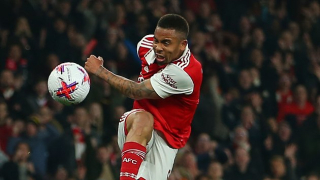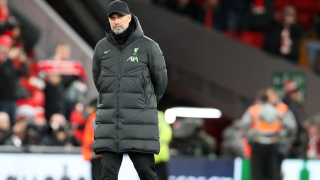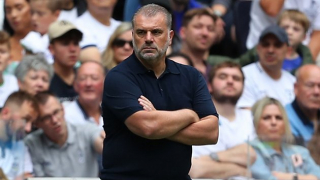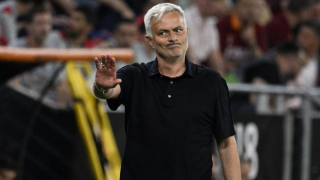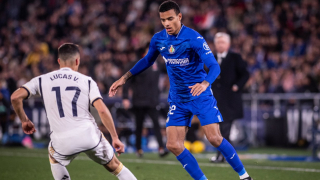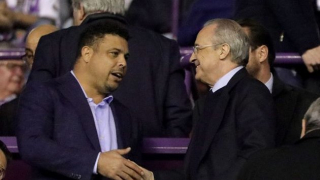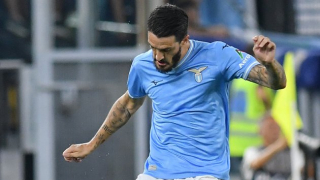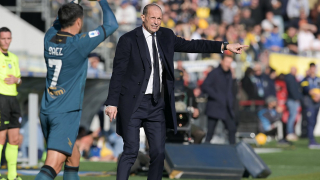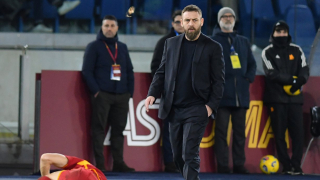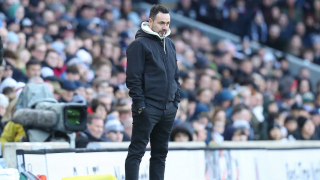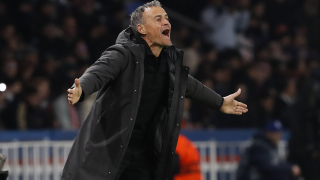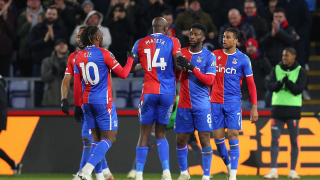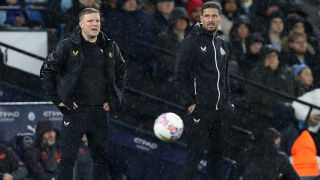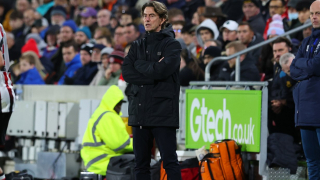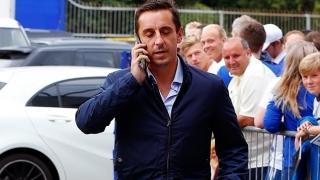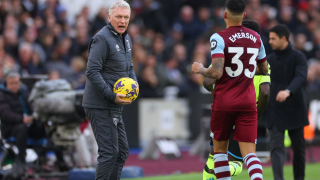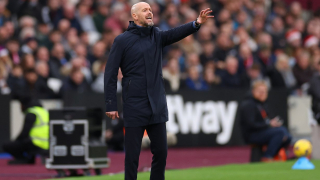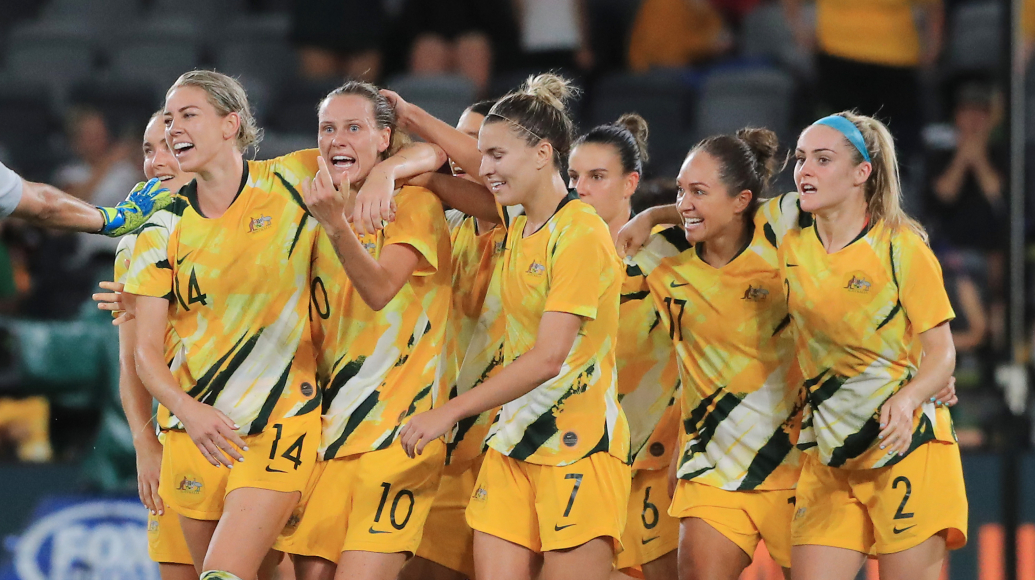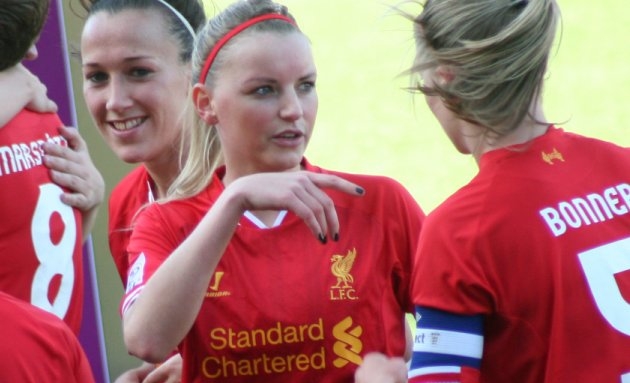This week, we look briefly at the first games of Groups A, B, C and D in the 2023 Women's World Cup in Australia and New Zealand, which started on July 20. We also present—for some teams—late news, final rosters, etc. and an interview with New Zealand WNT forward Gabi Rennie, following on from our four-part WWC preview over the past four weeks (see:
Groups A and B four weeks ago (The Week in Women's Football: World Cup Groups A & B preview; Calgary Foothills exclusive - Tribal Football;
Groups C and D three weeks ago: (The Week in Women's Football: Kaylan Williams exclusive - a USA star playing for Dinamo Moscow - Tribal Football;
Groups E and F two weeks ago: (The Week in Women's Football: World Cup Groups E & F preview; pressure on Marta - Tribal Football;
Groups G and H last week: (www.tribalfootball.com/articles/the-week-in-women-s-football-world-cup-groups-a-b-preview-calgary-foothills-exclusive-4463860).
Group A
New Zealand 1 vs. Norway 0 on July 20 in Auckland/Tmaki Makaurau
Hannah Wilkinson scored New Zealand's historic goal in the 48th minute to give the Football Ferns their first ever WWC Finals win in 16 games with a 1-0 win over heavily favored Norway (the New Zealand men's team has never won a match in their six final matches in 1982 and 2010, though they finished undefeated in their group with three ties in the later event). New Zealand took the game to Norway and was encouraged by a home crowd of 42,137 at Eden Park at Auckland—a record crowd to watch any football (soccer) match—women's or men's.
The entire team played well with their new recruit from Australia Indiah Paige-Riley a revelation on the right side along with veteran CJ Bott to supply the attack led by Wilkinson. This was not a game that saw the Football Ferns bunkered down and they actually led in shot attempts over Norway (11 vs. 10) and shots on target (2 vs. 1) and New Zealand had a heavy advantage in corner kicks (8 vs. 2). Also, New Zealand controlled the ball well and were near equal to their opponents on pass attempts (338 vs. 349) and pass completions (245 vs. 241). New Zealand even had a chance to go 2-0 up but veteran defender Ria Percival, who was instrumental in her team's victory, hit the crossbar on a penalty kick as regulation time expired. Norway put up a concerted effort to haul back at least a point in the last 15 minutes and 10 minutes of injury time, but New Zealand held firm and came away with a memorable win to kick off what could be a tournament with many more upsets.
Goalkeeper Victoria Esson (32) of Rangers in Scotland, who played previously at home, in Norway and for Texas Tech University in the States, recorded the shutout. The game went on despite the tragic mass shooting that same morning in the central Auckland business district, with three deaths (including the gunman) and ten injuries. We send our sympathies to the families of the deceased and best to the injured for a rapid recovery.
For Norway, after failing to make it out of the group stage at the last two Women's EUROs and falling in the quarterfinals stage in 2019, the question is, how can such a talented team with top class talent at major European club sides, including Olympique Lyon's Ada Hegerberg, Barcelona's Caroline Graham Hansen, Chelsea's Guro Reiten and Arsenal's Frida Maanum, consistently fail to deliver at the national team level? This group is wide open and New Zealand has a very good chance to make the knock-out stage which, along with a first win, was one of their goals. We think the Philippines could surprise in this group and Norway still has to face Switzerland, who are an experienced side. Well done to New Zealand and their win should galvanize support in the country, which has been cautious as ticket sales for matches overall have been disappointing so far.
Philippines 0 vs. Switzerland 2 on July 21 in Sydney/Gadigal
The Philippines started play brightly and actually had the ball in the net through Katrina Guillou early in the first half (15th minute) but it was waived off for offsides. Veteran forward Ramona Bachman scored a key goal from the penalty spot for the Swiss just before halftime and Seraina Piubel (23) of FC Zurich doubled the margin just after the hour mark.
Philippines head coach Alen Stajcic was pleased with his side's effort after the game: "To come to this level and play against players from Europe, against a team like that, is miraculous."
He has previously referred to the Filipinas participations at the final as: "a miracle," given that the team has so few players at home and has to draw from their considerable diaspora around the world.
He added: "[The players] showed courage and competitiveness throughout against our rivals, who had several players playing for professional clubs. We had our moments… There's no double that they are the better team and they should be. I was really proud of the spirit that our team showed. I think we showed that we can be competitive."
New Zealand's 23 women roster for the 2023 Women's World Cup Finals has four players based in England, three in Australia, two in Scotland, two in the U.S. (one in the NWSL and one in college), with one each in Denmark, Finland, Iceland and Sweden, while eight were listed as unattached to a club (see more below):
2023 New Zealand Women's World Cup Roster (caps/goals):
Elizabeth Anton (18/0) Perth Glory, Australia*
CJ Bott (37/2) Leicester City, England
Katie Bowen (92/3) Unattached
Claudia Bunge (20/0) Melbourne Victory, Australia*
Olivia Chance (43/2) Celtic, Scotland
Milly Clegg (2/0) Unattached*
Daisy Cleverley (31/2) HB Køge, Denmark
Victoria Esson (14/0) Rangers, Scotland
Michaela Foster (4/0) Unattached*
Jacqui Hand (12/1) Åland United, Finland*
Betsy Hassett (143/13) Stjarnan, Iceland
Grace Jale (17/2) Unattached*
Anna Leat (9/0) Aston Villa, England*
Annalie Longo (127/15) Unattached
Erin Nayler (84/0) IFK Norrköping, Sweden
Ria Percival (161/15) Tottenham Hotspur, England
Gabi Rennie (24/2) Arizona State University, USA*
Ali Riley (152/2) Angel City, USA
Indiah-Paige Riley (7/0) Unattached*
Paige Satchell (42/2) Unattached
Malia Steinmetz (18/0) Unattached*
Rebekah Stott (89/4) Brighton & Hove Albion, England
Hannah Wilkinson (113/28) Melbourne City, Australia
*FIFA Women's World Cup debut
TribalFootball.com talked with Football Ferns forward Gaby Rennie on July 12 while she was in New Zealand at training camp just ahead of their first game with Norway. I asked her about their second group game against Philippines, telling her that: "You played the Philippines last fall in Los Angeles and won 2-1 [their last win in ten matches before a training camp win over Vietnam (2-0) in Napier on July 9, before then losing to Italy 1-0 on July 14 in Auckland]. Their head coach Alen Stajcic, has brought in more diaspora from Australia and Scandinavia since that game. In a general sense, what did you learn from that first game and what do you need to change when you face this updated squad to be successful against the Philippines."
Rennie replied: "Philippines are going to be quite a different team from when we played them a year ago. We are still predicting a lot of the same principles that they showed [in L.A] but they will be a lot cleaner. Biggest thing for us is that there will be some slight adjustments [that she didn't want to reveal ahead of the match] but being aware from us that there is going to be a slight change [from them] but we are not changing too much and are focusing on ourselves in the game."
I also asked Gabi Rennie about the efforts to expand the links that New Zealand and Oceania Football Federation nations have with other federations—particularly with the Asian Football Confederation—for after the 2023 Women's World Cup, explaining that, some years ago, when I was in the country to cover the New Zealand-Bahrain Final intercontinental playoff game in late 2009 [which New Zealand won 1-0 to qualify for the 2010 South Africa men's Finals], that New Zealand Football executives told me that the goal was not to directly join the AFC [like Australia did on January 1, 2006], but to have interregional play-ins for global tournaments at all levels with AFC nations, in order to gain experience and potentially provide extra spots for Oceania teams. I specifically asked her what she had heard about future plans for New Zealand Football and Oceania and what she thought should be done to grow the game in the region.
Rennie replied: "For New Zealand personally, just more international matches is important. Prior to this World Cup campaign, we were playing only once or twice a year [at home per year] and obviously [our WNT] girls were playing across the world and traveling to get together… This [WWC] has created a really good relationship with New Zealand Football and Australia Football [Federations] and there has been talk about setting up maybe a yearly or every two years match series, which would really help as Australia is a really good competitor and help us on visibility in New Zealand. We need to get in people's faces and show that there is a path for it [for youth to play professionally and for their national team].
"For Oceania, honestly a lot of it does come down to money and development. We in New Zealand are more fortunate with resources; we need to distribute resources and be more supportive and help women's football [in the region]."
As we saw with the 2022 Oceania Women's Nations Cup (which doubled as 2023 WWC Qualifiers)—which New Zealand did not participate in as they had already qualified as a host team—the head coaches of Papua New Guinea and Samoa came from New Zealand where they live. Some teams did tours to Europe, Singapore and Australia before the tournament and that is good and showing development, but the OFC—smaller in the number of members than another other confederation—still has a large gap to close to be competitive on a regular basis with New Zealand alone much less many other nations in Asia and other regions.
Rennie also explained that things have changed in terms of youth soccer in New Zealand since she was growing up in the Christchurch area on the South Island: "In New Zealand there wasn't as much development as the likes of the U.S.; you had to put in a little bit extra miles to get some development [from Rotorua on the North Island where she grew up] and by playing with girls' teams—there wasn't enough girls playing sport when I was younger. Even in the time that I've reached the national team, the development numbers have grown a lot… We still have a long way to go and there is movement in the right direction."
She said also that she played on boys' teams as a youth because there weren't a lot of higher level girls' teams available.
As the second ever Arizona State University player/alumni selected to a WWC Finals team after Amy LePeilbet (2000-2003), who won a silver medal at the 2011 Women's World Cup in Germany with the U.S., Rennie said: "It's cool that I'm not only representing New Zealand at this World Cup but I'm also representing [the] ASU Sun Devils…it makes me proud and excited that I have the entire Sun Devils team behind me...and gives me a lot of encouragement."
Rennie is expected to return for her senior year at ASU in the fall.
One of the surprise cuts ahead of the Final Roster was Meikala Moore (27), who played with Glasgow City last season after two seasons with Liverpool in England; she previously played in Germany with FC Koln and Duisburg. Moore famously scored three own goals in one game (in the first half) in a 5-0 loss to the U.S. in February 2022 in Carson (Los Angeles), California. Goalkeeper Lily Alfeld (27), who has played with Wellington Phoenix for the past two seasons—though she was injured all of last season—and Perth Glory for one season before that, also did not make the final 23 for the World Cup; she was in camps and on game rosters this season for the Ferns but did not play in any matches.
For the eight unassigned players (above), a few updates are as follows:
- Katie Bowen (29) played for FC Kansas City/Utah Royals/Kansas City Current from 2018 through 2021 after playing collegiately at the University of North Carolina. She played in two games with the North Carolina Courage in 2022 and was released early to play with Melbourne City in the A-League Women in 2022/23.
- Milly Clegg (17) played with Wellington Phoenix last season and plans to play for Western Sydney Wanderers this coming season.
- Michaela Foster (24) played for Wellington Phoenix last season in the A-League Women.
- Grace Jale (24) played last season with Canberra United, scoring three goals after scoring six in Wellington Phoenix's debut season in the league in 2021-22; she is expected to play in Canberra again in 2023-24 as she signed a two-year contract last season.
- Annalie Longo (32) last played in the A-league Women with Melbourne Victory for two seasons, ending in 2020/21.
- Indiah-Paige Riley (21) was capped once by Australia in 2021 but is a dual citizen and shifted to the Ferns in 2022. She has played for Brisbane Roar since she was 17 and then three seasons with Fortuna Hjorring in Denmark through the 2022-23 season.
- Paige Satchell (25) played with Wellington Phoenix last season after playing the previous season with Sydney FC.
- Malia Steinmetz (24) spent the last two seasons with Western Sydney Wanderers after playing for Perth Glory in 2020-21.
For Switzerland, who qualified for their second ever Women's World Cup Finals after 2015 in Canada, one day after being selected for their final roster, 16-year-old midfielder Iman Beney (BSC Young Boys of Bern) suffered an ACL knee injury in training. She had impressed in her international debut, a 3-3 draw with Zambia. Beney was replaced by Bayer Leverkusen's Amira Arfaoui.
Of the 23 players now bound for New Zealand for the Swiss, four each play in Spain and Germany, three each play in England and France and nine are based in the Swiss league:
Goalkeepers: Seraina Friedli (Zurich), Livia Peng (Levante/ESP), Gaëlle Thalmann (Real Betis/ESP)
Defenders: Eseosa Aigbogun (Paris FC/FRA), Luana Buehler (Hoffenheim/GER), Viola Calligaris (Levante/ESP), Laura Felber (Servette), Noelle Maritz (Arsenal/ENG), Lara Marti (Bayer Leverkusen/GER), Nadine Riesen (Zurich), Julia Stierli (Zurich)
Midfielders: Amira Arfaoui (Bayer Leverkusen/GER), Sandrine Mauron (Servette), Seraina Piubel (Zurich), Géraldine Reuteler (Eintracht Frankfurt/GER), Marion Rey (Zurich), Coumba Sow (Servette), Lia Wälti (Arsenal/ENG)
Forwards: Ramona Bachmann, (Paris Saint-Germain/FRA), Ana Maria Crnogorevi (Barcelona/ESP), Fabienne Humm (Zurich), Alisha Lehmann (Aston Villa/ENG), Meriame Terchoun (Dijon/FRA)
Norway's final roster of 23 includes 13 playing in five different nations throughout Europe—England (7), Italy (3), Spain (2), France (1) and Germany (1)—with nine based at home in Norway:
Goalkeepers: Cecilie Fiskerstrand (LSK Kvinner), Guro Pettersen (Valerenga), Aurora Mikalsen (Brann)
Defenders: Anja Sonstevold (Inter Milan/ITA), Tuva Hansen (Bayern Munich/GER), Guro Bergsvand (Brighton/ENG), Maren Mjelde (Chelsea/ENG), Thea Bjelde (Vålerenga), Mathilde Harviken (Rosenborg), Sara Horte (Rosenborg), Marit Bratberg Lund (Brann)
Midfielders: Ingrid Syrstad Engen (FC Barcelona/ESP), Vilde Boe Risa (Man. United/ENG), Guro Reiten (Chelsea/ENG), Frida Maanum (Arsenal/ENG), Amalie Eikeland (Reading/ENG), Julie Blakstad (Man. City/ENG), Emilie Haavi (Roma/ITA)
Forwards: Caroline Graham Hansen (FC Barcelona/ESP), Ada Hegerberg (Lyon/FRA), Sophie Roman Haug (Rom/ITA), Karina Sævik (Valerenga), Anna Josendal (Rosenborg)
The Philippines final roster of 23 players was a bit of a surprise, particularly as last year at the 2022 Women's Asian Cup Finals/2023 WWC Regional Qualifiers in India, Australian native head coach Alen Stajcic had six local players from the Philippines; now there is only one. Since then and even over the past six months, Stajcic has added more diaspora—previously the nation had been heavily reliant on Americans—from some based in Scandinavia and Australia, with none perhaps more important than long-time Melbourne Victory standout Angie Beard (25), whose mother is from the Philippines.
She was a late addition to the squad after joining the Filipinas in their training camp back in October 2022, even though she had been capped at the senior level by Australia on three occasions. Beard, who previously played for Brisbane, Melbourne Victory (winning the league in 2020/21), KR in Iceland and Fortuna Hjorring in Denmark prior to joining expansion side Western United last season, is a raiding wing back who is also a lock-down defender; we have covered her in depth over the years in our reporting of the A-League Women.
For the Philippines final roster, there is still a heavy emphasis on the American diaspora which they have utilized for over five years now, with 18 born in the U.S. (nine from California where the nation frequently holds camps and does a lot of recruiting), with two born in Norway, one in Canada and one in Australia. For their club affiliations, six are currently based in Australia, four in the U.S. (but none with professional sides), two each in Iceland, Norway, Sweden and one each in Brazil, the Philippines and Serbia, with four unattached (see more below):
Goalkeepers: Kiara Fontanilla (Central Coast Mariners/AUS), Kaiya Jota (LA Breakers/USA), Olivia McDaniel (free agent).
Defenders: Alicia Barker (Pacific Northwest/ex-University of Illinois/USA), Angela Beard (Western United/AUS), Reina Bonta (Santos/BRA), Jessika Cowart (Kalmar/SWE), Malea Cesar (Blacktown City/AUS—but born in the U.S.), Sofia Harrison (free agent), Hali Long (Kaya-Iloilo), Dominique Randle (Por/KA/ICE)
Midfielders: Tahnai Annis (Por/KA/ICE), Ryley Bugay (free agent), Anicka Castañeda (Mt. Druitt Town Rangers/AUS), Sara Eggesvik (KIL/Hemne/NOR), Quinley Quezada (Red Star Belgrade/SRB), Jaclyn Sawicki (Western United/AUS)
Forwards: Sarina Bolden (Western Sydney/AUS), Isabella Flanigan (West Virginia University/USA), Carleigh Frilles (Coastal Carolina Univ./USA), Katrina Guillou (Piteå IF/SWE), Chandler McDaniel (free agent), Meryll Serrano (Stabæk/NOR)
The free agents are:
- Goalkeeper Olivia McDaniel—ex-Cal State Fullerton and University of Wisconsin-Milwaukee.
- Defender Sofia Harrison—she was born in the U.S. and played for a few months in late 2022 with Werder Bremen in Germany, though she did not see any regular season game action.
- Midfielder Ryley Bugay—born in the States, she played collegiately at Marquette University in Milwaukee, for FC Indiana in 2017 in the WPSL and FC Saarbrucken in Germany in 2019.
- Forward Chandler McDaniel—played at Virginia Tech and UW-Milwaukee collegiately.
Sisters Olivia and Chandler McDaniel are trying to find a club abroad that they can sign for together.
For the Filipinas, there were three alternates named:
- Inna Palacios (24)—a goalkeeper who grew up in the Philippines and played collegiately and at home there.
- Maya Alcantara (22)—the defender was born in California and played at St. Mary's College in Moraga, California and at Georgetown University in Washington D.C.
- Bella Pasion (16)—she is in high school in Frisco (Dallas area), Texas, which even to be an alternate, is quite an achievement for the young player.
A late cut was Eva Madarang (25), who was born in the U.S. and has played in England with Doncaster Rovers Belles in England and with Roma CF and Pozoalbensein in Italy's Serie B. She is currently playing with Blacktown Spartans this season in the New South Wales State League, with two goals in nine matches. She has played almost 50 games with the Philippines senior national team.
Group B
Australia 1 vs Ireland 0 on July 20 in Sydney/Gadigal
Steph Catley scored from the penalty spot in the 52nd minute as Australia defeated Ireland 1-0 in the opening match in Australia for the 2023 Women's World Cup in front of 75,784 at Stadium Australia in Sydney. As expected, Ireland's defense was strong but their attacks were few, as Australia had 3 shots on goal to 1, and a heavy advantage in shots (13 vs. 7) and possession (65% vs. 35%). American forward Marissa Sheva took down Haley Raso in the box for the penalty that Catley converted from. One downside for Australia is that forward Sam Kerr missed the first match and will miss at least the second group match as well against Nigeria, as she injured a calf muscle during training two days before the first game; there are some concerns that she could be out for the entire tournament.
Mackenzie Arnold (West Ham United in the WSL) recorded the shutout in her first WWC match, even though she is on her third tournament side. Australia captured the three points in front of a record crowd for a women's international—over 25,000 more than their previous record set six days before in Melbourne against France (see below) and set themselves up nicely to advance from the group. The Irish need to regroup and pull out a win against either Nigeria or Canada to have any hope of advancing to the knockout stage. One good thing is that injury concerns from their last two friendlies—Katie McCabe and Denise O'Sullivan (see below)—both started the match, though O'Sullivan was substituted in the 41st minute.
Nigeria 0 vs. Canada 0 on July 20 in Melbourne/Naarm
This was a game that Canada largely dominated possession for and in attacks (except for the last 15 minutes when Nigeria was buoyant in attack) and the Maple Leafs must feel that they lost two points while Nigeria seemed quite happy with the point from the tie. Christine Sinclair had a penalty kick saved by young Nigerian goalkeeper Chiamaka Nnadozie (22), who has played for Paris FC in France for the last three seasons, by diving to her left and snuffing the effort. If Sinclair scores in this tournament, she will set a record for scoring in six consecutive WWCs.
Their usual penalty taker, Chelsea's Jessie Fleming, was not cleared by the medical staff for the game.
Head coach Bev Priestman defended her striker after the match: "Christine Sinclair's scored many, many, many goals for this country and I'm sure the fans, the team and everyone can forgive missing a penalty kick. Penalty kicks are a 50-50 chance and, on this day, Sinc didn't score. At the end of the day, this team and this country loves Christine Sinclair more than anything. And so they'll rally around her and we'll have her ready for the next game."
There is some concern about Canada's lack of scoring in 2023 as they have been shutout in three of five games, scoring only twice and allowing seven goals. Canada can be encouraged by the very strong play of Jayde Riviere (22), who moved to Manchester United this season after playing collegiately at the University of Michigan. She was strong in defense and contributed to many offensive moves.
For Nigeria, defender Onome Ebi (40), like Sinclair, is on her sixth WWC side but did not play in the match. One downside is that a VAR review resulted in a late (98th minute) red card for 19-year-old Deborah Abiodun (changed from a yellow), who will play for head coach Randy Waldrum in the fall as well at the University of Pittsburgh.
She said after the game on Twitter: It's a dream come true to start in my first senior #FIFAWWC match. I'm happy and honoured by the privilege. A bit disappointed my debut to end the way it did. I'm sorry. Overall, I'm grateful for the chance and proud of my team today. Thanks for your support, always, #DA13."
She had a strong game but will miss the next match versus Australia. Abiodun is from Ibadan and played at home with top side Rivers Angels.
Though Canada and tied are tied in the Group Standings on one point, behind Australia (3 points) and ahead of Ireland (0 points), Nigeria should be pleased with the result from, what one coach described to me as: "The battle of teams whose Federations can't or won't invest in their women's teams," while the pressure is now on Canada.
The finals roster for Canada, which 2021 Olympic Gold Medal-winning head coach Bev Priestman announced on July 9, includes nine players based in the U.S. (with eight in the NWSL and one in college), England (8), Italy (1), France (1), Portugal (1) and Sweden (1), along with two who are unattached to clubs:
Goalkeepers (3): Kailen Sheridan (San Diego Wave FC/USA), Sabrina D'Angelo (Arsenal/ENG), Lysianne Proulx (SCU Torreense/POR)
Defenders (7): Kadeisha Buchanan (Chelsea/ENG), Gabrielle Carle (Washington Spirit/USA), Allysha Chapman (Houston Dash/USA), Vanessa Gilles (Lyon/FRA), Ashley Lawrence (Chelsea/ENG), Jayde Riviere (Manchester United/ENG), Shelina Zadorsky (Tottenham Hotspur/ENG)
Midfielders (5): Simi Awujo (USC/USA), Jessie Fleming (Chelsea/ENG), Julia Grosso (Juventus/ITA), Quinn (OL Reign/USA), Sophie Schmidt (Houston Dash/USA)
Forwards (8): Jordyn Huitema (OL Reign/USA), Cloe Lacasse (Arsenal/ENG), Adriana Leon (Manchester United/ENG), Nichelle Prince (Houston Dash/USA), Deanne Rose (Unattached), Christine Sinclair (Portland Thorns/USA), Evelyne Viens (Kristianstads DFF/SWE), Olivia Smith (Unattached)
There were a few surprises from the preliminary roster we previewed last month as midfielder Desiree Scott was not included, as she was recovering from knee surgery last December and was deemed not sufficiently recovered to play; she has not featured for the Kansas City Current in the NWSL at all in 2023. One other notable omission besides Scott is Jade Rose (20) from Harvard University, who left camp in Australia with an undisclosed injury and was ruled out of the tournament.
Olivia Smith, an 18-year old who played for Penn State University in her freshman year, was a surprise addition to the squad. She was not named to Canada's provisional 25-player roster for their pre-tournament camp, but joined the team in Australia in late June as a training player. Priestman told Canada's sports network TSN: "I felt Olivia can cover us in wide areas, even the nine and even in the midfield and I felt, with where we're at with the roster, she brings a difference, like a wildcard in terms of different positions. So, it's super exciting and [Smith has] an incredible future, so for me I'm investing in the future."
In an interview on TSN's roster reveal show, Smith said that she will not return to Penn State for her sophomore year this fall but will turn professional and is heading to an undisclosed club "overseas." She can play both in the midfield and as a forward. Similar to Smith, defender Gabrielle Carle of the Washington Spirit also was not on Canada's pre-tournament roster, but was named to the final 23-player roster on Sunday.
Besides Olivia Smith, Deanna Rose is also not currently with a club; she played the last two seasons at Reading in the WSL, who were relegated this season and she is out of contract.
Forward Cloe Lacasse (29) signed with Arsenal of the WSL on June 29 ahead of the 2023-24 campaign. She scored 70 goals in 74 regular season games in four seasons for Benfica in Portugal, after playing five seasons with IBV in Iceland. Lacasse won three league titles, three Portuguese League Cups and two Portuguese Super Cups during four years with the Eagles.
Arsenal boss Jonas Eidevall said: "She is a proven goal scorer and will add a different dimension to our attack… I'm really pleased we have signed Cloe to strengthen our forward line. She has shown her quality over a number of seasons in two European leagues as well as in the Champions League."
Lacasse signed for Benfica from Icelandic side IBV in 2019 and scored 102 goals in 131 games in total for the Portuguese champions. In the 2022-23 season, she won the league's player of the year award and played in the Champions League in each of her four seasons in Portugal.
Captain Christine Sinclair (40) is back for her sixth World Cup. Six others were named to the squad having played two or more World Cups: Sophie Schmidt with four prior appearances, and Allysha Chapman, Kadeisha Buchanan, Adriana Leon, Jessie Fleming, and Ashley Lawrence, who have all played in two previous WWC Finals. Besides Olivia Smith, there are five other first-time WWC participants: Simi Awujo, Vanessa Gilles, Cloé Lacasse, Lysianne Proulx, and Evelyne Viens.
While the WNT is in Australia, the Canadian Soccer Association (CSA)—which the players have been battling all year in a dispute over pay and budget for resources and national team friendlies—has revealed that it is running low on cash and revenues are badly lagging, with possible bankruptcy looming. Jason de Vos (49), the interim general secretary and a former national team player with 49 caps—who played professionally in Canada and England, including over 170 games with Ipswich Town from 2004 through 2008 (part of that time as captain)—said that the CSA currently doesn't have money for any of their national teams (men, women or youth for both genders) to play internationals this fall.
Jason de Vos further explained: "We are in a real struggle. It's not imminent, but we need to explore what bankruptcy entails and how it might affect our organization. We don't have enough revenue coming in for the programs that need to be run."
Canada Soccer used more than $3.04 million of its $3.8 million in public funding in 2022, while its cash reserves fell to $1.82 million — down from $5.4 million at the end of 2021. In 2026, Toronto and Vancouver will host games for the men's World Cup in North America—with games also in the States and Mexico—which should boost revenues and interest in the game in Canada. That event is a long way off though and the prospect of the CSA going through bankruptcy is staggering.
The Republic of Ireland's FA has struggled with their financials for years—in part thanks to past executives who were more concerned with their own benefits and perks than for the sport—but UEFA helped them stabilize. Will the Canadian government or CONCACAF help to bail out the CSA? CONCACAF struggles at times to support the sport in many developing markets such as Guyana and Dominica and may not have the excess funds to help out the Canadians. The down side is that, no matter how well the Canadian women do in Australia, their national team program will be adversely affected at least in 2023 and 2024, impacting the growth of the game in a country that did such a stellar job of hosting the 2015 WWC Finals.
For Australia, Swedish native head coach Toni Gustavsson named his final squad of 23 players for their WWC finals at home, including nine from England (one was on loan last season from a Swedish side), six in Sweden, two each in the U.S. and Australia and one each in France and Norway, with two unattached (though Hayley Raso—who played for Manchester City of the WSL for the past two seasons, signed with Real Madrid of Spain on July 8—the first Australian and AFC woman to join the club—and Kyah Simon was with Tottenham Hotspur for the past two seasons after a short time with PSV in the Netherlands in 2020-21.
Name | Position | Club | Caps (goals) |
Mackenzie Arnold | Goalkeeper | West Ham United (ENG) | 34 (0) |
Ellie Carpenter | Defender | Olympique Lyon (FRA) | 61 (3) |
Steph Catley | Defender | Arsenal (ENG) | 109 (3) |
Midfielder | Racing Louisville (USA) | 26 (2) | |
Kyra Cooney-Cross | Midfielder | Hammarby IF (SWE) | 27 (0) |
Caitlin Foord | Forward | Arsenal FC (ENG) | 108 (29) |
Mary Fowler | Midfielder | Manchester City (ENG) | 36 (9) |
Katrina Gorry | Midfielder | Vittsjo GIK (SWE) | 93 (17) |
Charlotte Grant | Defender | Vittsjo GIK (SWE) | 18 (1) |
Clare Hunt | Defender | Western Sydney Wanderers (AUS) | 5 (0) |
Alanna Kennedy | Defender | Manchester City (ENG) | 108 (8) |
Forward | Chelsea (ENG) | 120 (63) | |
Aivi Luik | Defender | BK Hacken (SWE) | 42 (1) |
Teagan Micah | Goalkeeper | FC Rosengarrd (SWE) | 14 (0) |
Courtney Nevin | Defender | Leicester City (ENG) on loan from Hammarby IF (SWE) | 21 (0) |
Clare Polkinghorne | Defender | Vittsjo GIK (SWE) | 156 (16) |
Forward | Unattached | 70 (12) | |
Kyah Simon | Forward | Unattached | 111 (29) |
Emily van Egmond | Midfielder | San Diego Wave (USA) | 127 (30) |
Cortnee Vine | Forward | Sydney FC (AUS) | 16 (3) |
Clare Wheeler | Midfielder | Everton (ENG) | 13 (0) |
Lydia Williams | Goalkeeper | Brighton and Hove Albion (ENG) | 102 (0) |
Tameka Yallop | Midfielder | SK Brann (NOR) | 112 (12) |
Australian veterans Lydia Williams and Clare Polkinghorne were selected for their fifth WWC Finals. Sam Kerr, who has scored 63 goals in 120 Australian appearances, is the captain and is in her fourth Finals, as are Caitlin Foord, Emily van Egmond and Tameka Yallop. Nine players on the team have over 100 caps.
The biggest surprise in the squad was Gustavsson selecting Kyah Simon, who is coming back from injury (as she did for the 2019 WWC Finals when she just missed the final 23 under then coach Ante Milicic). Simon (32) has 111 caps and is heading to her third World Cup. She did enough over the past few weeks in camp on Australia's Gold Coast to warrant her inclusion, despite not having played a competitive game for Tottenham Hotspur in England at all since tearing her ACL last year. Simon's iconic goal in 2015 in Australia's Round of 16 1-0 upset win over Brazil in Canada is a benchmark event for the women's team in their history.
Manchester City defender Alanna Kennedy (28) also made the squad, even though she has struggled with injury for months, and not played with the Matildas since last September. She has 108 senior caps and only played in two regular season games at Manchester City in 2022-23. Fellow veterans Clare Polkinghorne, Emily van Egmond and Tameka Yallop also made the squad, despite similar lack of recent game time due to injuries. Dynamic attacker Mary Fowler, who has not been seen on a pitch since sustaining a back injury for Manchester City towards the end of the WSL season, was also selected. Fowler scored the only goal of the game in a friendly game against France on July 14 in Melbourne, which attracted a record crowd of 50,629, which was the largest crowd ever to see the Matildas in Australia and a great sign for the interest in the team and the WWC Finals in the nation.
Gustavsson cut six players to get to the FIFA mandated 23 players: young goalkeeper Jada Whyman (23 of Sydney FC), Chloe Logarzo (28 of Western United), Amy Sayer (21 of Stanford University in the U.S.), Larissa Crummer (27, who played the last two seasons with the Brisbane Roar and moved to Brann of Norway in March), Emily Gielnik (31 of Aston Villa of the WSL and who was on the side in 2019 in France after narrowing missing past World Cup and Olympic Finals sides) and Remy Siemsen (23, who played with AIK of Sweden, Sydney FC and Leicester City of the WSL since 2022). Those players remain on standby should any of the selected 23 pull out.
There are seven players who were called into their first WWC Finals: defenders Clare Hunt, Charlotte Grant and Courtney Nevin; midfielders Clare Wheeler, Kyra Cooney-Cross and Alex Chidiac—who was a surprise omission in 2019 despite playing in the top women's league in Spain at the time—and Courtnee Vine in attack.
On the Republic of Ireland's final roster, head coach Vera Pauw has the vast majority playing for clubs in England (14), four are in the U.S. (with three in the NWSL and one in college), two play in Scotland, two play at home in Ireland and one is based in Germany:
Goalkeepers: Courtney Brosnan (Everton/ENG), Grace Moloney (Reading/ENG), Megan Walsh (Brighton & Hove Albion/ENG).
Defenders: Aine O'Gorman (Shamrock Rovers), Louise Quinn (Birmingham City/ENG), Niamh Fahey (Liverpool/ENG), Diane Caldwell (Reading/ENG), Claire O'Riordan (Celtic/SCO), Megan Campbell (Liverpool/ENG), Chloe Mustaki (Bristol City/ENG), Heather Payne (Florida State Univ./USA), Izzy Atkinson (West Ham United/ENG)
Midfielders: Katie McCabe (Arsenal/ENG), Denise O'Sullivan (NC Courage/USA), Ruesha Littlejohn (Aston Villa/ENG), Ciara Grant (Hearts/SCO), Lily Agg (London City Lionesses/ENG), Sinead Farrelly (Gotham FC/USA), Lucy Quinn (Birmingham City/ENG)
Forwards: Abbie Larkin (Shamrock Rovers), Kyra Carusa (London City Lionesses/ENG), Amber Barrett (Potsdam Turbine/GER), Marissa Sheva (Washington Spirit/USA)
Note: Amber Barrett signed with Standard Liege in Belgium for the 2023-24 season, who won the Belgium Cup last season. Her former club Potsdam in Germany was relegated last season and she saw limited game time in the second half of the season after returning from an injury. She scored the lone goal against Scotland in the UEFA qualifying playoffs in Glasgow to send the Republic to the promised land of the WWC Finals for the first time.
Niamh Fahey (35), has signed a new contract with Women's Super League club Liverpool, where she has played for the past five seasons. Aoife Mannion, who plays at Manchester United, was a late roster deletion due to an injury she has been carrying.
On July 14, less than a week before the Finals were to start, a tune-up match between the Irish and Colombia was cancelled after 20 minutes as the game turned violent on the pitch. Denise O'Sullivan (North Carolina Courage) was taken to the hospital in Brisbane and initially was thought to be doubtful for the opener in Sydney against Australia. After her injury, Vera Pauw talked to her FAI Executives and then the referee, who cancelled the game; Ireland then played an intersquad scrimmage. The Irish implied that Colombia amped up the aggro as they had two yellow cards during those 20 minutes.
Colombia WNT officials said in a release: "The Colombian Football Federation informs that the friendly match that was to take place as part of today's training between the Colombia women's national team and Ireland was suspended because the Irish national team preferred not to continue playing when 23 minutes of the first half had elapsed. Although all the processes and training of our teams are framed within the rules of the game, healthy competition and fair play, we respect the decision of our rival team."
Colombian defender Daniela Caracas was blunter in her assessment, telling reporters after the game to: "Let them [the Irish] eat s@#$" and labelling them as "little girls".
Vera Pauw told Sky Sports: "It was something I had never experienced before in my 47 years being involved in football, not as a player, not as a coach. It started lively, a good game, normal, and then the atmosphere built up to becoming over-physical. Then there came a huge challenge on Denise, a challenge not within the rules of the game and she was in awful pain. I went to the coach of Colombia and I said: 'I need help from you; we need to calm this down. We all want to go to the World Cup.'"
Pauw told the Irish radio show Off The Ball: "We do not fear any physical contact, you know that, we are ourselves a team that, within the rules of the game, we are a very tough-playing team. The players, [for] the first time since I am coaching them, they feared, they feared for their bodies."
Pauw calmed down her players and then the coaching and executive staff decided to request the referee to end the game because they were worried about more injuries.
After the game, O'Sullivan returned to camp from a Brisbane hospital with a soft tissue injury but no fracture as was first feared. Pauw said they will evaluate her throughout the week to see if she can play in the opener versus Australia in front of an expected 80,000 crowd in Sydney on July 20
Even before the game, there was controversy between the two teams as fans were not allowed into the match at the last minute, with numerous fans of both sides left outside the gates.
It is a little odd that the Irish—never seen as a gentle side—felt that the game was too difficult for them. This physical game could be Colombia's approach for their group games. We have seen this strategy on occasion in the past. When Mexico upset Canada to qualify for the 2004 Olympic Games (Canada had finished fourth in the 2003 Women's World Cup just months earlier), Mexico head coach at the time Leo Cuellar told me shortly after the game that they had decided to be very physical against the Canadians in that match, changing from their typical ball control game, in order to battle Canada, for who at the time physical play was part of the preferred by then head coach Even Pellerud; Cuellar told me that it worked because Canada didn't expect that approach and couldn't adjust to it during the game.
This injury news came after Ireland lost to France 3-0 in Dublin in their last game before leaving for Australia on July 6, when Katie McCabe rolled her ankle and had to leave the game within the first 20 minutes. The Irish captain and Arsenal mainstay made a pass with the outside of her boot and seemed to catch her toe in the turf and straining her ankle. After treatment she tried to play again but could not continue more than a few minutes and was removed in the 31st minute.
After the match, McCabe told Sky Sports at the Dublin Airport ahead of her flight to Australia: "I'm feeling good. I've been for scans this morning and everything's looking really positive so I'm in a good place. Hopefully I'll be back on the pitch early next week."
The Dublin native and inspirational leader of the team has 20 goals in her 72 appearances for her country.
In front of a record crowd of 7,632 at Tallaght Stadium for a women's international, Kyra Carusa scored in the 11th minute but was ruled for offside, which was an arguable call. Ireland's bright play was undone by soft defending and they allowed two goals in first half injury time, both to Maelle Lakrar of Montpellier, who scored her first two senior international goals in just her third appearance. Veteran Lyon striker Eugenie Le Sommer scored her 89th goal for France in the second half.
We talked in our preview of Group B last month about the pressure that head coach Randy Waldrum was under from the Nigeria Football Federation (NFF) regarding his college coaching position—he also coaches the women's team at the University of Pittsburg. As we moved closer to the tournament, Waldrum himself talked about more issues that he has faced with the Nigerian Federation, including pressure to pick a local goalkeeper that he had never seen and to ditch his long-time assistant Lauren Gregg—who was an assistant coach to the U.S. when they won WWC titles in 1991 and 1999—and who is very highly thought of in the women's game.
The NFF is also in arrears on salary payments to coaches as well as to the players [this has happened for the latter at the AFCON championships in 2004, 2016 and 2022 and at the WWC in 2007 and 2019, so it is not a new thing and even more inexcusable]. Waldrum said that he had been owed thirteen months of salary but had recently seven months of pay. Reportedly some of the players haven't been paid for two years and since, FIFA recently announced that they will play players directly for participating in the Finals (at least $30,000 and more if they qualify for knockout stages), the NFF has reportedly said that they didn't need to pay the players what they are owed, which are quite minimal per day bonuses.
What is interesting is that, in the days leading up to the tournament, FIFA has clarified that there is no way that they can pay the 736 players directly, so the money will be distributed by the associations. FIFA President Gianni Infantino explained just as the Women's World Cup was starting: "We have an association of associations. So whatever payments we do, we will go through the associations and then the associations will, of course, make the relevant payments to their own players. We are in touch with all the associations."
Good luck to the players of Nigeria in getting that money from the NFF; at the very least FIFA or the FIFPRO should track how many of the players for each of the 32 national teams at the Finals received their full payments afterwards and when. There have also been rumblings that the players could boycott their first WWC match against Canada, but that isn't likely, as they would lose their leverage with the NFF and upset FIFA and the local Australian organizing committee as well. As the tournament started, Waldrum said, "We will be there. All of that transpired before we came and I think the team, once we all arrived here, have just focused on Canada. We met about it the first night we arrived, and at that point, we all just agreed not to continue to discuss it, not let it be out there and that we're here to do a job."
This writer was very critical of the South Africa WWC player pay dispute that was primarily a Federation issue (see our Group G and H preview from last week) but in some ways this conflict could be even more disruptive to the team's play in Australia/New Zealand.
At the end of June, Waldrum talked to John Krysinsky of Pittsburgh Soccer Now for the "Sounding Off on Soccer Podcast" and said: "I know we're not prepared the way we need to be [for the WWC Finals]. I have been very frustrated in recent months, in particular in recent weeks, with the federation and the lack of support we've gotten in so many different levels. The NFF had canceled a 10-12 day training camp in Nigeria just ahead of leaving for Australia… You would have hoped we would have used that time… for preparation. Unfortunately, that hasn't been the case… I joke about it with people here in the U.S. We have less days than a college preseason, to get ready for a World Cup. It blows my mind."
That is a pretty shocking comparison as the U.S. college season is typically three months total in length, with 3-5 weeks of preseason training/practice games added on.
Waldrum had to pick a final 23 based on an earlier camp in April and he had not seen any prospects for his squad or been able to assess player fitness levels, particularly since some of the players' leagues ended in May.
Waldrum then proceeded to recount that, during the Women's African Cup of Nations tournament—where Nigeria qualified for the World Cup in July 2022—players were not paid their wages: "The players hadn't been paid, so they boycotted [after their penalty kick tie-breaker loss to Morocco, following a 1-1 deadlock in which they played half of the second half and all thirty minutes of overtime with nine players through red cards]. They wouldn't come out of the hotel rooms. For two days, they sat in their rooms. We didn't train. They wouldn't come out and do any recovery, wouldn't take care of their bodies, couldn't do any video, couldn't do any scouting, and we had to play Zambia [in the third place match]. So, the federation flew in the night before we played Zambia and brought a little bit of money, and pacified them with a little bit of money. They met with the team and wanted to discuss why and what it would be like moving forward, so we had a team meeting that night, about 10 p.m. We played the next afternoon at 4 p.m."
They lost the third place game to Zambia (1-0) on a 29th minute Copper Queens goal. The NFF wasn't happy that their squad didn't win the African tournament (which they had done in nine of the previous eleven editions of the Women's AFCON and triumphed as CAF champions in the two earlier editions as well) and didn't even finish with a medal among the top three finishers, apparently forgetting the fact that, by making the semifinals, they had qualified for the WWC Finals for the ninth consecutive time and have competed in every tournament.
Lauren Gregg told Equalizer Soccer in the U.S. that their semifinal against Morocco was a superior effort by Nigeria, in Rabat in front of 45,562 home fans: "Randy and I both feel it's probably our best coaching game ever—to be able to carry nine players against 11 for 60 minutes and pull out a draw is unprecedented. You don't find that anywhere in the world … One of our American-Nigerians missed [a penalty], and the federation faulted us for that. They're very angry that we lost. That started a lot of the dissent."
On the goalkeeper issue that directly affected Waldrum's ability to take his lead assistant to the WWC Finals, the Federation wanted him to take, as his third goalkeeper, a young local player but he never saw her play because the June camp was cancelled by the NFF.
Waldrum explained: "I didn't get to see this goalkeeper. So, then they wanted me to turn in my final roster of 23 [players], and they wanted me to put this goalkeeper on, that I have never seen, never been in one of our camps, and I refused to do it. I said, 'I can't take a player that I've never had in camp.' That's ridiculous. Who would do that? This is the World Cup."
He said that he would have had to cut Yewande Balogun (33), who, when he first brought her into the squad, was a full-time assistant coach at University of California-Davis. She quit her full time job at UC-Davis after three seasons and dedicated herself to playing full-time for Nigeria since being called into camp by Waldrum in 2021. She had played at the University of Maryland and then was an assistant coach at American University in Washington D.C. and at Maryland. She also helped lead the Ottawa Fury of the W-League to the 2009 league semifinals and competed with the Washington Freedom W-League squad in 2010. In 2011, she was a member of the Chesapeake Charge in the WPSL, helping the team to an Open Cup finals appearance and a WPSL regional finals berth.
She even went to play in France's Division 2 Feminine with AS Saint-Etienne last season. Waldrum felt that she had put in so much effort for the national team and it wasn't right to replace her for someone he had never seen play. Balogun made the roster but the NFF then told coach Waldrum that he could not bring his assistant coach, Lauren Gregg.
Waldrum explained his bizarre conundrum when he said: "For the last two or three weeks, I've been fighting this battle, trying to get her back in. And now… to be quite honest, as of two weeks ago, they won't even answer my correspondence. I email, I text, I call. They won't even take a message. It's just, they don't want to deal with it anymore. So, it's just, we're not prepared properly on the field, we're not prepared with staffing, because the assistants they had given me aren't capable of giving you the kind of help you need in a World Cup… At some point, it becomes right and wrong. They initially said I could do one or the other — if I took the young goalkeeper, then Lauren could go. Or, if I took the goalkeepers that I wanted, then Lauren couldn't go."
At that point, he even questioned continuing to coach the side but he is so dedicated to the sport and continued because of the players. He said on the podcast: "A lot is going into the tactical piece of it with our team. I think, as good as [the opponents] are, we do have a talented group of players. That's why I was really hopeful that we'd have those [June training] weeks in Nigeria. That time would have given us the right amount of time to get them ready. I have to backtrack my plan and really, for these 10 days, focus on 1-2 key, big picture items that we want to do well against Canada."
TribalFootball.com interviewed Randy just after he took the job in 2021—we have known him for well over a decade—and we were particularly impressed by his long-range plans to develop the game in Nigeria through the local women's league, developing local coaches and improved grass roots soccer (see: The Week in Women's Football: Interview with Nigeria coach Waldrum; English teams professionalise; - Tribal Football).
Gregg emphasized this point when she said: "They (the NFF) don't seem to understand or appreciate that Randy has brought in a lot of local players. Some of them in the last year have moved to Europe. Six to eight players, over the last year, were local players and made our final roster [but only one that currently plays in Nigeria—but the country has so much talent playing abroad, more than any other African nation]. They're playing internationally [at the club level] now. That's a credit to them, making them viable candidates to make even more money abroad. For these players, that's their livelihood, and many support their families."
Nigeria has never been ultra-proficient at logistics for tournaments—with visa snafus—and last year during a fall trip to Japan for a friendly, Gregg said that some players flew in the day before the match and some even flew out the night of the match, which severely limited their preparation time with the players.
Even more shocking than the goalkeeper at an expense of a coach fiasco, the non-payment of salaries and the cancelled camp, Ademola Olajire, the NFF's communications director, responded forcefully to Randy's comments by referring to him as an: "Incompetent loudmouth… The team is presently having a 15-day training camp in Gold Coast [Australia] ahead of the Women's World Cup. Is it Mr. Blabbermouth Waldrum who has been paying? He claims he's (stayed in) the job because of the players. Bollocks. Worst coach to have handled the Super Falcons of Nigeria by a country mile."
We thought communications officials are supposed to present a positive message of their coaches, players and the organization they work for, but not so much here.
With all this distraction, Nigeria is throwing away a chance to make the knockout stage for the third time ever and second consecutive tournament, having played in all previous eight events, and the NFF is fully to blame. I think the gulf is too wide between the coaches and the NFF and I'm sure that the NFF will let Waldrum and his team go and use local coaches until the next regional or global final qualifiers begin. We do hope that Randy, Lauren and his other coaches and staff are paid what they are owed—as well as the players—because they have certainly worked hard in their two-plus years with Nigeria and improved the team and provided more opportunities for a number of players.
Note: Final roster cuts included forward Ngozi Okobi (29) of Levante of Spain, who played a few games for the Washington Spirit in the NWSL in 2015 but then played seven seasons in Sweden's Damallsvenskan (two at Vittsjo and then five with Eskilstuna) and midfielder Regina Otu (26), who played with Saint Etienne in the French Second Division last season, winning the championship and promotion to the top flight, after playing two seasons for Minsk in Belarus.
Group C
Spain 3 vs. Costa Rica 0 on July 21 in Wellington/Te Whanganui-a-tara
Spain, despite internal turmoil in their wider national team pool over their head coach, ended any concerns that they would fall like Norway did the night before to New Zealand, as they scored three goals within the first half hour to seal the match. Valeria Del Campo of Costa Rica scored an own goal in the 21st minute and then Aitana Bonmati (23') of Barcelona and Esther Gonzalez (27') of Real Madrid built on the lead in quick succession. Five minutes later, Jennifer Hermoso (Pachuca of Mexico) had a penalty kick saved by CR goalkeeper Daniela Solera (26—Sporting San Jose, who has played for clubs in Spain, Colombia and Finland). Spain overwhelmed the CONCACAF side with 46 shots on goals to only 1, (14 vs. 0 for shots on goal) and corners (22 vs. 1). Gonzalez now has 27 goals in 38 international matches. For the Ticas, 16-year-old Sheika Scott (LD Alajuelense) came on as a substitute in the second half, one of a few 16-year-olds on rosters in the tournament.
Zambia 0 vs Japan 5 on July 22 in Hamilton/Kirikiriroa
Japan took three points from their first Group C match on July 22 with an emphatic 5-0 win over Zambia, with four goals coming in the second half as Hinata Miyazawa (23) of Mynavi Sendai of Japan's WE-League scored twice.
Spain defeated Panama 7-0 in a warm-up friendly on June 26 in Aviles, Spain, with Alexia Putellas starting a match for the first time since her knee injury in 2022; she scored once in the match—a good sign for their WWC prospects this month. Esther Gonzalez (30) (who played at Real Madrid last season) scored a brace while Irene Guerrero (who played last season at Atletico Madrid) scored from the penalty spot and added two assists.
Spain's final roster is all from the Spanish league, except for one in Mexico:
Goalkeepers: Misa Rodriguez (Real Madrid), Cata Coll (Barcelona), Enith Salon (Valencia)
Defenders: Oihane Hernandez (Athletic Bilbao), Rocio Galvez (Real Madrid), Irene Paredes (Barcelona), Laia Codina (Barcelona) Ivana Andres (Real Madrid), Ona Batlle (Barcelona), Olga Carmona (Real Madrid)
Midfielders: Maria Perez (Barcelona) Teresa Avilleira (Real Madrid), Claudia Zornoza (Real Madrid), Aitana Bonmati (Barcelona) Jenni Hermoso (Pachuca/Mexico), Irene Guerrero (Atletico Madrid) Alexia Putellas (Barcelona)
Forwards: Mariona Caldentey (Barcelona), Eva Navarro (Atletico Madrid) Athenea Del Castillo (Real Madrid), Esther Gonzalez (Real Madrid), Salma Paralluelo (Barcelona), Alba Redondo (Levante)
Ona Battle signed with Barcelona for 2023-24, after leaving Manchester United. Atletico defender Shelia Garcia was a late cut after she sustained an injury.
For Japan, at the federation level, there is an example that drama is not just a province of Finalists from CONCACAF and CAF (Africa), as the nation is the only major market without a WWC Finals broadcaster just weeks before the tournament's start. This is endemic of a bigger problem with the promotion of the women's game in the country which made two consecutive WWC Finals in 2011 and 2015, winning the former over the U.S, in penalty kicks.
Norio Sasaki, Nadeshiko head coach between 2008 and 2016 and currently the director of women's soccer at the JFA, told Pro Soccer Wire in February: "We didn't think we needed to do something special (right away) for women's football because we misunderstood that the movement would last a long time."
The promotion of the game has lacked and even the launch of the WE [Women's Empowerment] league in 2021 has not been the resounding success it's U.S.-based founder hoped. We had interviewed her as she was starting the league and she was adamant that they did not need outside consultants on the marketing side, either from Europe, America or Japan. The COVID pandemic cut into their budgets and they have struggled for sponsors and crowds at games have lagged, particularly after the three month winter break. Some say that the decision to adopt a fall-spring calendar was a mistake; it was thought that it would facilitate player transfers between Japanese and European clubs. A special budget to acquire top players that was co-funded by the WE-league and the JFA did not deliver any top players, which dampened the overall quality of the league. The league had promised to expose Japanese players to the kind of opposition they would face at the elite international level.
The national team has struggled for years as well. Between 2010 and 2022, Nadeshiko played just 39 of its 170 games in Japan — less than half of the men's team's 89 out of 188.
For the television issue, FIFA had raised licensing fees for the event after decoupling it from the men's WC. WE-League Chair Haruna Takata has proposed a last-ditch crowd-funding campaign to help bridge the gap between the two sides: "When I was involved in club management, I was against crowd-funding, and that stance hasn't changed … I've made this decision because in our position, we're too weak to win this fight alone. It may be late, and it may fail … but I would rather regret doing it than regret not doing it."
This situation is just sad and it shows that there are still lots of issues to address in various countries around the world and not just in CONCACAF and CAF. The 2023 WWC is in Asia [Australia as a co-host with Oceania's New Zealand] for the first time since 2007 in China. Providing favorable time zones for viewers in Japan. Perhaps, FIFA should dive into these issues and host a global conference with the federations from the 2023 WWC and maybe another 10-20 nations, like what the top women's leagues did last year in conjunction with the Women's EURO Final. The Japanese people need to be able to watch this WWC or the game will stay at a low-key level; particularly if the team doesn't do well this summer, it will be a blip and the sport will continue to languish in the country.
Potential future players in the next generation will not be able to watch and be captivated. Part of the problem is that NHK was going to broadcast the games on terrestrial TV—the cost for the men's world Cup in Qatar was 35 billion yen (U.S. $25 million) and for the 2023 WWC was 11.6 billion (US$8.3 million). NKH tried to arrange a discounted price with FIFA but then stepped out of the bidding. Japan's WNT played two friendly matches in Japan on October 6 and 9 last year. The attendance for the Nigeria match, which was a night game on a weekday, was only 1,671, while the match against New Zealand on October 9, which was on a Sunday, drew 4,110. NHK has been struggling with revenues since COVID and sponsorship and advertising spends have been down in the industry. Finally, Abema streamed all of the World Cup games from Qatar.
Note: On July 21, FIFA announced that they had completed recent free-to-air deals, including in Japan with NHK and China PR with CCTV, along with other agreements with Central Asia (Saran), Chinese Taipei (ELTA), Hong Kong (PCCW), the Maldives (Medianet), Mongolia (Content Distribution LLC) and the Philippines (Cignal TV). FIFA said that the tournament: "Will be shown in over 200 territories, through 130 broadcasters and FIFA's own platform FIFA+ in the remaining markets. At least 70 of the broadcasters will be present during the competition in Australia and Aotearoa New Zealand." This is very good news, but if the agreements had been concluded earlier rather than just days before the WWC started, it would help the local broadcasters to publicize the game and create more buzz and hopefully more viewership.
Zambia joined South Africa and Nigeria with pre-WWC crises and meltdowns when, on July 8, it was revealed that Bruce Mwape [who was appointed to the job in May 2018] and the U-17 WNT coach Kaluba Kangwa, have been under investigation by the Football Association of Zambia (FAZ) since September of 2022.
Even though FIFA was made aware of the accusations, a FIFA spokesperson said it could not comment on ongoing investigations. "Please note that as a general policy, the independent ethics committee does not comment on whether or not investigations are under way into alleged cases. As usual, any information the ethics committee may like to share will be communicated at their discretion."
American Lisa Cole is on the technical committee and is eminently qualified to take over, but it appears that Mwape will coach the team in the WWC Finals and, undoubtedly a cloud will be over him and the team.
Group D
England 1 vs Haiti 0 on July 22 at Brisbane/Meaanjin
England used a single goal in the 29th minute by Georgia Stanway from the penalty spot—on her second attempt after Haitian goalkeeper Kerly Theus had save the first shot, but had been judged to have moved early off of her line—to defeat debutants Haiti, who are the second ever Caribbean side to the make the finals after Jamaica. England had more than twice the possession as Haiti and led in shots (19 vs. 6), shots on goal (10 vs. 2) and corners (7 vs. 3) but Haiti had three times the number of free kicks (15 vs. 5).
After the game, England head coach Sarina Weigman acknowledged that Haiti was a very difficult opponent: "That's a very hard game. I'm very happy with the three points. Haiti were what we said. They're unpredictable. Very transitional. We struggled with that. We had a lot of possession but they were really tough in the duels and very quick. We lost the ball at moments we weren't expecting, and then they were gone… The win is the most important thing. But yes, we need to finish our chances and be a little better in possession; a little faster."
For England, Chloe Kelly and Lauren James (as a substitute) on the left side were strong and Mary Earps in goal made some crucial saves to keep the shutout.
Haiti did have some dangerous attacks and Melchie Dumornay (OL Lyon in France) had a strong game.
Denmark 1 vs China 0 on July 22 at Perth/Boorloo Amalie Vangsgaard (26) of Paris St. Germain scored the only goal of the game in the 90th minute to give Denmark a 1-0 win in a very even match with China. Denmark led on total shots (12 vs. 8) but China had more shots on goal (2 vs. 1) and Denmark had a slight advantage in crosses (18 vs. 17) and corners (6 vs. 4)

